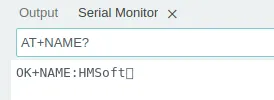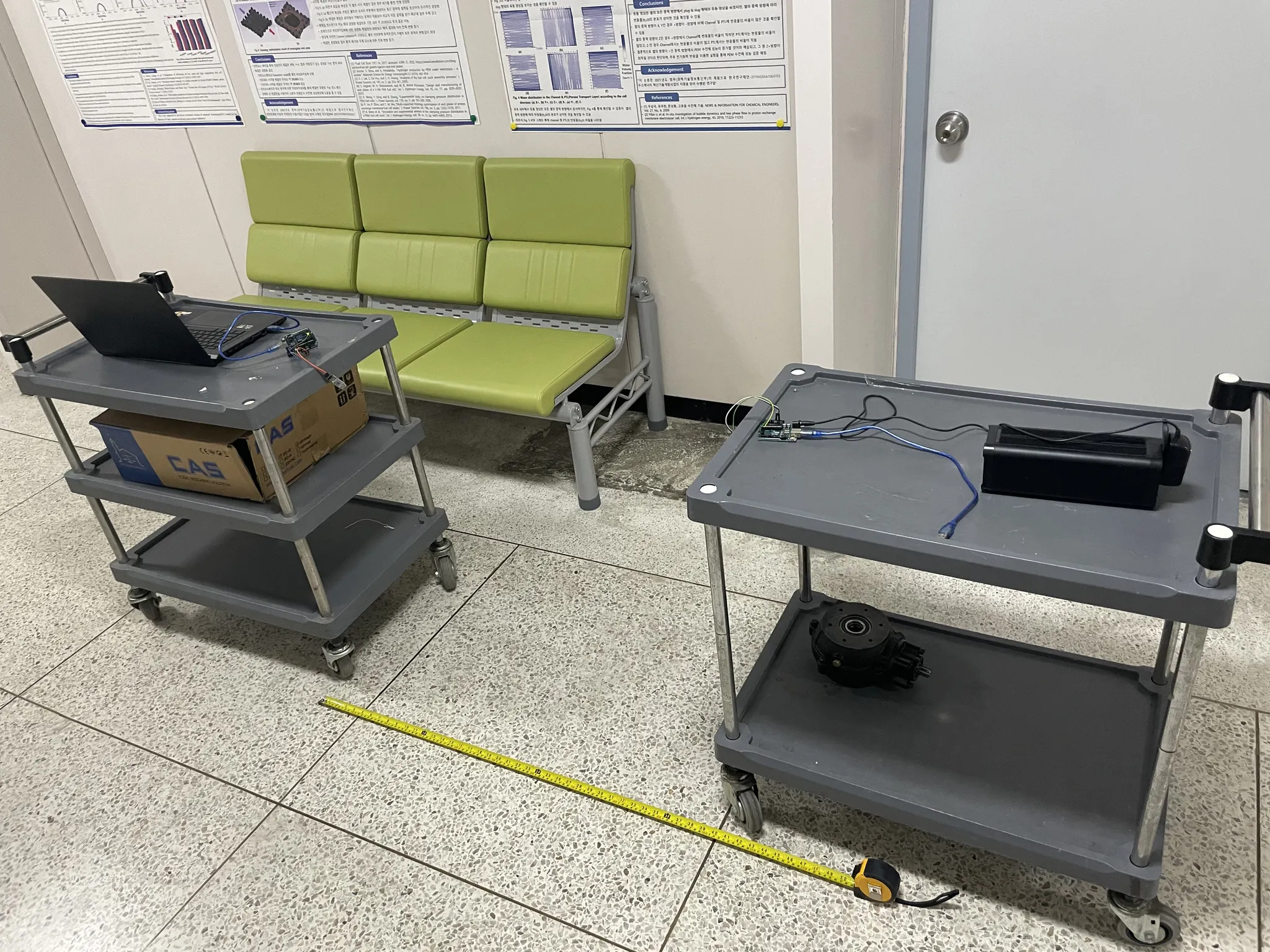1.
a.
세팅하는 코드는 다음과 같다
#include <SoftwareSerial.h> // 블루투스 시리얼 통신 라이브러리 추가
#define BT_RXD 2
#define BT_TXD 3
SoftwareSerial bluetooth(BT_RXD, BT_TXD); // 블루투스 설정 BTSerial(Tx, Rx)
void setup() {
Serial.begin(9600);
bluetooth.begin(9600); // 블루투스 통신 시작
}
void loop() {
if (bluetooth.available()) { // 블루투스에서 보낸 내용은 시리얼모니터로 전송
Serial.write(bluetooth.read());
}
if (Serial.available()) { // 시리얼모니터에서 보낸 내용은 블루투스로 전송
bluetooth.write(Serial.read());
}
}
Arduino
복사
b.
AT+BAUD? : 통신속도 확인하는 AT 명령어
현재는 AT+BAUD0을 통해 통신 속도가 9600으로 맞춰져 있다.
c.
AT+NAME? : 이름 확인하는 명령어
d.
AT+PASS? : 비밀번호 확인하는 명령어
2.
master - slave 아두이노 코드 업로드
a.
해당 코드를 실행하기 전에 slave의 mac address를 알아야 한다.
해당 AT 명령어를 입력하면 slave 모듈의 mac address를 알 수 있다. 그 다음
sendATCommand("AT+CON3CA308B57B47");
Arduino
복사
이렇게 12자리 mac address를 입력해 주면 된다.
b.
master
#include <SoftwareSerial.h>
#include <ros.h>
#include <std_msgs/String.h>
#include <ArduinoHardware.h>
SoftwareSerial bluetooth(2, 3); // RX, TX
ros::NodeHandle nh;
std_msgs::String rssi_msg;
ros::Publisher rssi_pub("rssi", &rssi_msg);
void setup() {
// nh.getHardware()->setBaud(9600);
nh.initNode();
nh.advertise(rssi_pub);
Serial.begin(9600);
bluetooth.begin(9600);
delay(1000);
// ArduinoHardware arduinoHardware;
// arduinoHardware.setBaud(9600);
//////////////////////////////
sendATCommand("AT+RENEW");
delay(2000);
//////////////////////////////
sendATCommand("AT");
delay(1000);
sendATCommand("AT+ADDR?");
delay(1000);
sendATCommand("AT+BAUD?");
delay(1000);
sendATCommand("AT+ROLE1");
delay(1000);
sendATCommand("AT+IMME1");
delay(3000);
// sendATCommand("AT+CON10CEA9FCDF5B");
// sendATCommand("AT+3CA308B57B47");
sendATCommand("AT+CON4C249818564B");
delay(1000);
String rssiData = "start!!!";
// Publish the RSSI data as a string to the "rssi" topic
rssi_msg.data = rssiData.c_str();
rssi_pub.publish(&rssi_msg);
}
void loop() {
// sendATCommand("AT+RSSI?"); // cost 40ms
// total 50ms
// Read RSSI data from the Bluetooth module
String rssiData = readATResponse("AT+RSSI?");
delay(10); // cost 10ms
// Publish the RSSI data as a string to the "rssi" topic
rssi_msg.data = rssiData.c_str();
rssi_pub.publish(&rssi_msg);
Serial.println(rssiData);
nh.spinOnce();
}
void sendATCommand(String command)
{
bluetooth.print(command);
delay(500);
while (bluetooth.available()) {
char c = bluetooth.read();
Serial.print(c);
}
Serial.print("\r\n");
// }
}
String readATResponse(String command) {
String response = "";
bluetooth.print(command);
delay(100);
while (bluetooth.available()) {
char c = bluetooth.read();
response += c;
Serial.print(c);
// return "1" + response ;
}
char c = bluetooth.read();
// response = c + "s";
return response;
}
Arduino
복사
c.
slave
#include <SoftwareSerial.h>
SoftwareSerial bluetooth(2,3); // RX, TX
void setup() {
//기본 통신속도는 9600입니다.
Serial.begin(9600);
bluetooth.begin(9600);
delay(1000); // 명령 실행에 충분한 시간을 줍니다.
sendATCommand("AT+RENEW");
delay(1000);
// sendATCommand("AT+RESET");
// delay(1000);
sendATCommand("AT");
delay(1000);
sendATCommand("AT+ADDR?");
delay(1000);
sendATCommand("AT+BAUD?");
delay(1000);
// ////////////////////////////////////
// sendATCommand("AT+BAUD3");
// delay(1000);
// sendATCommand("AT+RESET");
// delay(1000);
// Serial.begin(57600);
// bluetooth.begin(57600);
// ////////////////////////////////////////
sendATCommand("AT+MODE2");
delay(1000);
sendATCommand("AT+ROLE0");
delay(7000);
// sendATCommand("AT+IMME1");
// delay(1000);
}
void loop() {
if (bluetooth.available()) {
Serial.write(bluetooth.read());
}
if (Serial.available()) {
bluetooth.write(Serial.read());
}
}
void sendATCommand(String command)
{
bluetooth.print(command);
delay(500); // 명령 실행에 충분한 시간을 줍니다.
//Serial.print("hi1");
while (bluetooth.available()) {
char c = bluetooth.read();
//Serial.print("hi2");
Serial.print(c);
}
Serial.print("\r\n");
}
Arduino
복사
3.
ros 거리 계산 코드
#include <ros/ros.h>
#include <std_msgs/String.h>
#include <std_msgs/Float32.h>
#include <queue>
#include <iostream>
#include <vector>
#include <fstream>
#include <string>
#include <sstream>
#include <thread>
#include <boost/multiprecision/cpp_dec_float.hpp>
// #include <boost/multiprecision/detail/functions/pow.hpp>
#define CAL_DISTANCE(rssi, alpha, n, offset) (std::pow(10.0, ((alpha) - (rssi)) / (10.0 * (n))) + (offset))
////////////////////////////////////
// double rssi;
std::queue<double> rssiQueue;
// bool initialized = false;
std::vector<double> rssi_data;
///////////////////////////////////
const int avg_num = 15;
class KalmanFilter {
public:
KalmanFilter(double processNoise = 0.05, double measurementNoise = 20)
: processNoise(processNoise), measurementNoise(measurementNoise),
predictedRSSI(0), initialized(false),errorCovariance(100) {}
inline double filtering(double rssi) {
if (!initialized) {
initialized = true;
predictedRSSI = rssi;
} else {
double predictedRSSI = this->predictedRSSI;
double errorCovariance = this->errorCovariance + processNoise;
double kalmanGain = errorCovariance / (errorCovariance + measurementNoise);
this->predictedRSSI = predictedRSSI + kalmanGain * (rssi - predictedRSSI);
this->errorCovariance = (1 - kalmanGain) * errorCovariance;
}
return this->predictedRSSI;
}
private:
bool initialized;
double processNoise;
double measurementNoise;
double predictedRSSI;
double errorCovariance;
};
class MovAvgFilter {
public:
MovAvgFilter(int _n = avg_num) : n(_n) {
for (int i = 0; i < _n; ++i) {
xBuf.push(1.0);
}
prevAvg = 0.0;
}
double filtering(double x) {
double front = xBuf.front();
xBuf.pop();
xBuf.push(x);
double avg = prevAvg + (x - front) / n;
prevAvg = avg;
return avg;
}
private:
double prevAvg;
std::queue<double> xBuf;
int n;
};
class SmoothingFilter {
public:
SmoothingFilter(double alpha = 0.2) : alpha(alpha), initialized(false),smoothedValue(0) {}
double filtering(double value) {
if (!initialized) {
initialized = true;
smoothedValue = value;
} else {
smoothedValue = alpha * value + (1 - alpha) * smoothedValue;
}
return smoothedValue;
}
private:
double alpha;
bool initialized;
double smoothedValue;
};
// double cal_distance(double rssi, double alpha = -55.0, double n = 2.0, double offset = 0.0) {
// double distance = pow(10.0, (alpha - rssi) / (10.0 * n));
// return distance + offset;
// }
double cal_distance(double rssi, double alpha = -52.0, double n = 2.0, double offset = 0.0) {
using namespace boost::multiprecision;
cpp_dec_float_100 distance = pow(cpp_dec_float_100(10), (alpha - rssi) / (10.0 * n));
return static_cast<double>(distance + offset);
}
KalmanFilter filter;
KalmanFilter filter_2;
KalmanFilter filter_3;
void rssi_callback(const std_msgs::String& data) {
if (data.data.empty()) {
return;
} else if (data.data == "OK+CONNF") {
return;
} else if(data.data.find("OK+Get:") != std::string::npos)
// {
// // Create a separate thread for filtering and logging
// SmoothingFilter filter;
// KalmanFilter filter_2;
// std::string line = data.data;
// std::string remove_line = line.substr(7); // Remove "OK+Get:"
// double rssi = std::stod(remove_line);
// std::thread dataProcessingThread([data](){
// SmoothingFilter filter;
// KalmanFilter filter_2;
// std::string line = data.data;
// std::string remove_line = line.substr(7); // Remove "OK+Get:"
// double rssi = std::stod(remove_line);
// double filtered_rssi = rssi;
// // double filtered_rssi = filter.filtering(rssi);
// // double filtered_rssi_2 = filter_2.filtering(filtered_rssi);
// double final_distance = cal_distance(filtered_rssi);
// // double final_distance = CAL_DISTANCE(filtered_rssi,-55.0 ,2.0, 0.0);
// // double filtered_distance = filter_2.filtering(final_distance);
// // Log the data in a separate thread
// ROS_INFO("RSSI to Distance : %f", final_distance);
// std::string path = "/home/kym/catkin_ws/src/arduino/src/distance_log.txt";
// std::ofstream logFile(path, std::ios::app);
// logFile << filtered_rssi << std::endl;
// logFile.close();
// });
// dataProcessingThread.detach();
// }
{
// Create a separate thread for filtering and logging
std::string line = data.data;
std::string remove_line = line.substr(7); // Remove "OK+Get:"
double rssi = std::stod(remove_line);
// rssiQueue.push(rssi);
double filtered_rssi = filter.filtering(rssi);
// double filtered_rssi_2 = filter_2.filtering(filtered_rssi);
// double final_distance = cal_distance(filtered_rssi);
double final_distance = CAL_DISTANCE(filtered_rssi,-60.0 ,1.0, 0.0);
// double filtered_distance = filter_3.filtering(final_distance);
// Log the data in a separate thread
ROS_INFO("RSSI to Distance : %f", final_distance);
std::string path = "/home/kym/catkin_ws/src/arduino/src/distance_log.txt";
std::ofstream logFile(path, std::ios::app);
logFile << final_distance << std::endl;
logFile.close();
}
}
double run()
{
std::string path = "/home/kym/catkin_ws/src/arduino/src/distance_log.txt";
std::vector<double> original_data;
std::vector<double> filtered_data;
std::vector<double> distance_list;
// 파일에서 원본 데이터 읽어오기
std::ifstream file(path);
if (file.is_open()) {
double rssi;
while (file >> rssi) {
original_data.push_back(rssi);
}
file.close();
} else {
std::cerr << "Failed to open file." << std::endl;
return 1;
}
KalmanFilter filter_1;
for (double rssi : original_data) {
double filtered_rssi = filter_1.filtering(rssi);
filtered_data.push_back(filtered_rssi);
}
for (double rssi : filtered_data) {
double distance = cal_distance(rssi);
distance_list.push_back(distance);
}
// 이제 distance_list를 사용하여 거리 데이터를 처리할 수 있습니다.
for (double distance : distance_list) {
std::cout << "Distance: " << distance << std::endl;
}
return 0.0;
}
int main(int argc, char** argv) {
ros::init(argc, argv, "rssi_listener");
ros::NodeHandle nh;
std::string path_2 = "/home/kym/catkin_ws/src/arduino/src/distance_log.txt";
std::ofstream logFileTemp(path_2);
logFileTemp.close();
KalmanFilter filter;
try {
std::cout << "hi " << std::endl;
ros::Subscriber sub = nh.subscribe("/rssi", 10, rssi_callback);
// run();
// cal_rssi();
// rssi_pub = nh.advertise<std_msgs::Float32> ("raw_rssi",1);
ros::spin();
}
catch (ros::Exception& e) {
// Handle exceptions
}
return 0;
}
C++
복사
4.
CmakeList.txt
cmake_minimum_required(VERSION 3.0.2)
project(arduino)
## Compile as C++11, supported in ROS Kinetic and newer
# add_compile_options(-std=c++11)
## Find catkin macros and libraries
## if COMPONENTS list like find_package(catkin REQUIRED COMPONENTS xyz)
## is used, also find other catkin packages
find_package(catkin REQUIRED COMPONENTS
roscpp
rospy
std_msgs
message_generation
)
find_package(Boost REQUIRED COMPONENTS system)
## System dependencies are found with CMake's conventions
# find_package(Boost REQUIRED COMPONENTS system)
## Uncomment this if the package has a setup.py. This macro ensures
## modules and global scripts declared therein get installed
## See http://ros.org/doc/api/catkin/html/user_guide/setup_dot_py.html
# catkin_python_setup()
################################################
## Declare ROS messages, services and actions ##
################################################
## To declare and build messages, services or actions from within this
## package, follow these steps:
## * Let MSG_DEP_SET be the set of packages whose message types you use in
## your messages/services/actions (e.g. std_msgs, actionlib_msgs, ...).
## * In the file package.xml:
## * add a build_depend tag for "message_generation"
## * add a build_depend and a exec_depend tag for each package in MSG_DEP_SET
## * If MSG_DEP_SET isn't empty the following dependency has been pulled in
## but can be declared for certainty nonetheless:
## * add a exec_depend tag for "message_runtime"
## * In this file (CMakeLists.txt):
## * add "message_generation" and every package in MSG_DEP_SET to
## find_package(catkin REQUIRED COMPONENTS ...)
## * add "message_runtime" and every package in MSG_DEP_SET to
## catkin_package(CATKIN_DEPENDS ...)
## * uncomment the add_*_files sections below as needed
## and list every .msg/.srv/.action file to be processed
## * uncomment the generate_messages entry below
## * add every package in MSG_DEP_SET to generate_messages(DEPENDENCIES ...)
## Generate messages in the 'msg' folder
# add_message_files(
# FILES
# Message1.msg
# Message2.msg
# )
## Generate services in the 'srv' folder
# add_service_files(
# FILES
# Service1.srv
# Service2.srv
# )
## Generate actions in the 'action' folder
# add_action_files(
# FILES
# Action1.action
# Action2.action
# )
## Generate added messages and services with any dependencies listed here
generate_messages(
DEPENDENCIES
std_msgs
)
################################################
## Declare ROS dynamic reconfigure parameters ##
################################################
## To declare and build dynamic reconfigure parameters within this
## package, follow these steps:
## * In the file package.xml:
## * add a build_depend and a exec_depend tag for "dynamic_reconfigure"
## * In this file (CMakeLists.txt):
## * add "dynamic_reconfigure" to
## find_package(catkin REQUIRED COMPONENTS ...)
## * uncomment the "generate_dynamic_reconfigure_options" section below
## and list every .cfg file to be processed
## Generate dynamic reconfigure parameters in the 'cfg' folder
# generate_dynamic_reconfigure_options(
# cfg/DynReconf1.cfg
# cfg/DynReconf2.cfg
# )
###################################
## catkin specific configuration ##
###################################
## The catkin_package macro generates cmake config files for your package
## Declare things to be passed to dependent projects
## INCLUDE_DIRS: uncomment this if your package contains header files
## LIBRARIES: libraries you create in this project that dependent projects also need
## CATKIN_DEPENDS: catkin_packages dependent projects also need
## DEPENDS: system dependencies of this project that dependent projects also need
catkin_package(
# INCLUDE_DIRS include
# LIBRARIES arduino
# CATKIN_DEPENDS roscpp rospy std_msgs
# DEPENDS system_lib
)
###########
## Build ##
###########
## Specify additional locations of header files
## Your package locations should be listed before other locations
include_directories(
# include
${catkin_INCLUDE_DIRS}
)
## Declare a C++ library
# add_library(arduino src/write_ros_2.cpp)
## Add cmake target dependencies of the library
## as an example, code may need to be generated before libraries
## either from message generation or dynamic reconfigure
# add_dependencies(${PROJECT_NAME} ${${PROJECT_NAME}_EXPORTED_TARGETS} ${catkin_EXPORTED_TARGETS})
## Declare a C++ executable
## With catkin_make all packages are built within a single CMake context
## The recommended prefix ensures that target names across packages don't collide
add_executable(write_ros_2 src/write_ros_2.cpp)
add_dependencies(write_ros_2 ${${PROJECT_NAME}_EXPORTED_TARGETS} ${catkin_EXPORTED_TARGETS})
# target_link_libraries(write_ros_2 ${catkin_LIBRARIES} ${PCL_LIBRARIES})
target_link_libraries(write_ros_2 ${catkin_LIBRARIES} ${Boost_LIBRARIES})
## Rename C++ executable without prefix
## The above recommended prefix causes long target names, the following renames the
## target back to the shorter version for ease of user use
## e.g. "rosrun someones_pkg node" instead of "rosrun someones_pkg someones_pkg_node"
# set_target_properties(${PROJECT_NAME}_node PROPERTIES OUTPUT_NAME node PREFIX "")
## Add cmake target dependencies of the executable
## same as for the library above
# add_dependencies(${PROJECT_NAME}_node ${${PROJECT_NAME}_EXPORTED_TARGETS} ${catkin_EXPORTED_TARGETS})
## Specify libraries to link a library or executable target against
# target_link_libraries(${PROJECT_NAME}_node
# ${catkin_LIBRARIES}
# )
#############
## Install ##
#############
# all install targets should use catkin DESTINATION variables
# See http://ros.org/doc/api/catkin/html/adv_user_guide/variables.html
## Mark executable scripts (Python etc.) for installation
## in contrast to setup.py, you can choose the destination
# catkin_install_python(PROGRAMS
# scripts/my_python_script
# DESTINATION ${CATKIN_PACKAGE_BIN_DESTINATION}
# )
## Mark executables for installation
## See http://docs.ros.org/melodic/api/catkin/html/howto/format1/building_executables.html
# install(TARGETS ${PROJECT_NAME}_node
# RUNTIME DESTINATION ${CATKIN_PACKAGE_BIN_DESTINATION}
# )
## Mark libraries for installation
## See http://docs.ros.org/melodic/api/catkin/html/howto/format1/building_libraries.html
# install(TARGETS ${PROJECT_NAME}
# ARCHIVE DESTINATION ${CATKIN_PACKAGE_LIB_DESTINATION}
# LIBRARY DESTINATION ${CATKIN_PACKAGE_LIB_DESTINATION}
# RUNTIME DESTINATION ${CATKIN_GLOBAL_BIN_DESTINATION}
# )
## Mark cpp header files for installation
# install(DIRECTORY include/${PROJECT_NAME}/
# DESTINATION ${CATKIN_PACKAGE_INCLUDE_DESTINATION}
# FILES_MATCHING PATTERN "*.h"
# PATTERN ".svn" EXCLUDE
# )
## Mark other files for installation (e.g. launch and bag files, etc.)
# install(FILES
# # myfile1
# # myfile2
# DESTINATION ${CATKIN_PACKAGE_SHARE_DESTINATION}
# )
#############
## Testing ##
#############
## Add gtest based cpp test target and link libraries
# catkin_add_gtest(${PROJECT_NAME}-test test/test_arduino.cpp)
# if(TARGET ${PROJECT_NAME}-test)
# target_link_libraries(${PROJECT_NAME}-test ${PROJECT_NAME})
# endif()
## Add folders to be run by python nosetests
# catkin_add_nosetests(test)
Bash
복사
5.
터미널 실행 명령어(b : 아두이노 실행 명령어, d : 거리 계산 코드 실행 명령어)
a.
roscore
b.
sudo chmod 777 /dev/ttyA*
c.
rosrun rosserial_python serial_node.py _port:=/dev/ttyACM0 _baud:=9600
d.
rostopic echo /rssi
e.
rosrun arduino write_ros.py
6.
수행 사진






